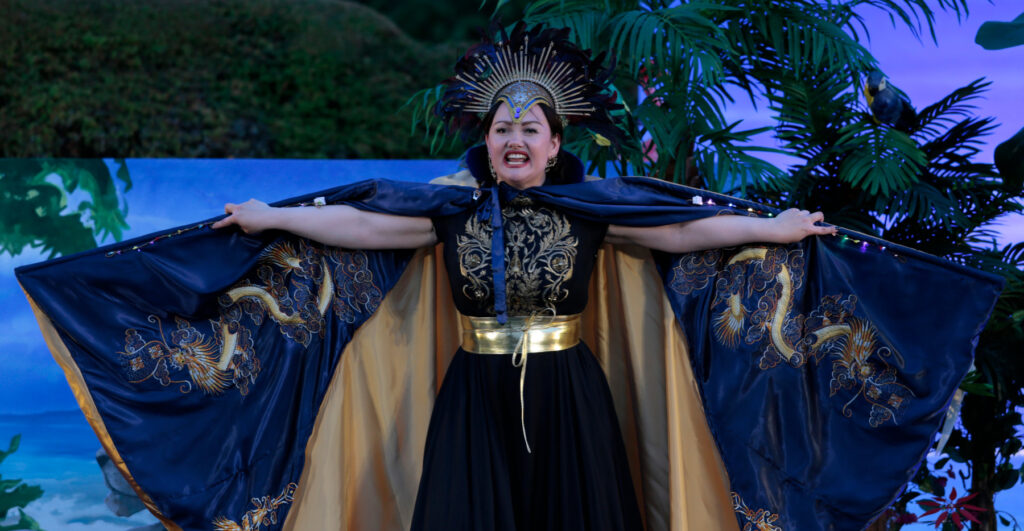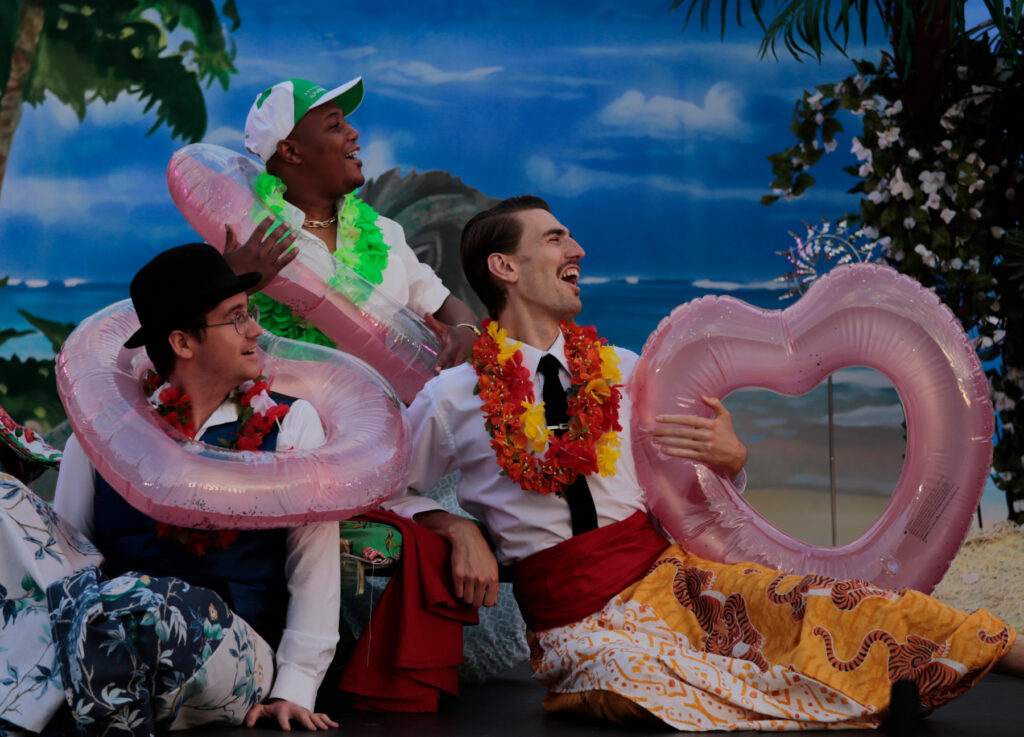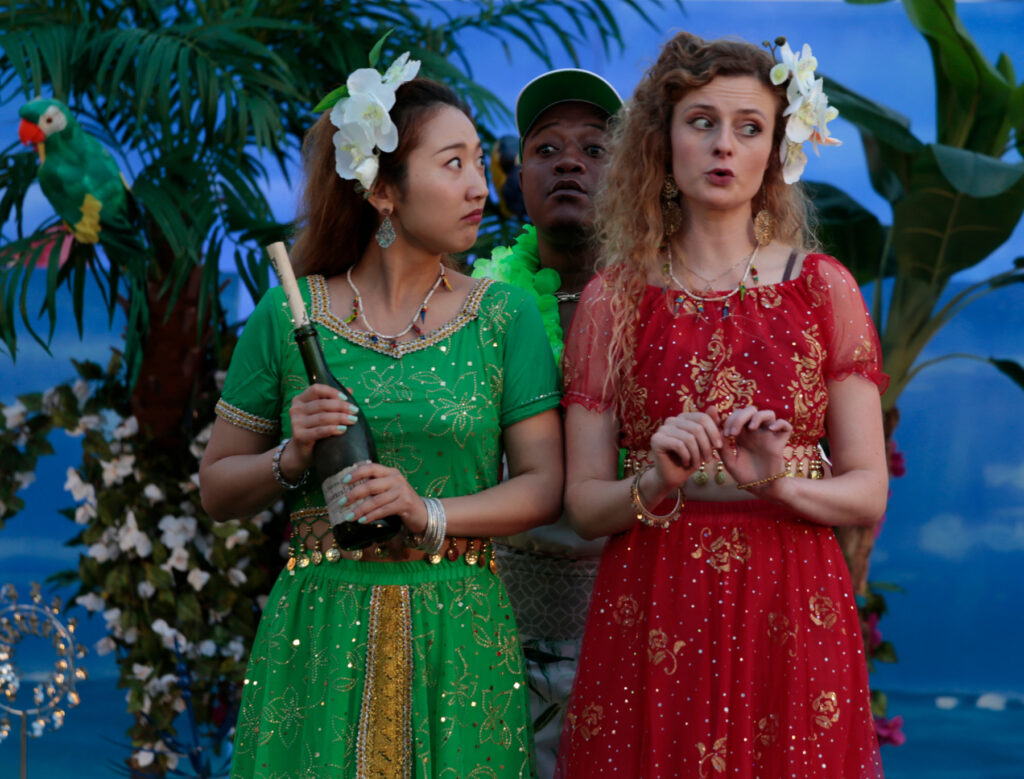Bampton Classical Opera brought Giuseppe Gazzaniga’s L’Isole d’Alcina (Alcina’s Island) to London in Gilly French’s English translation in a production directed and designed by Jeremy Gray with Thomas Blunt conducting Chroma. Written in 1771 and premiered in Venice, Giovanni Bertati’s libretto does not take opera seria too seriously and concerns four characters washed up on a desert island. Not any old island, but Alcina’s island, yet the time period is contemporary, and the four men (later five) are well aware of Alcina and her tale, told in Ariosto. The result is a delightful comic operatic romp.
If the name of Giuseppe Gazzaniga seems familiar, that is because he and Giovanni Bertati wrote Don Giovanni in 1787, which was plagiarised by Da Ponte for Mozart. Gazzaniga’s L’Isole d’Alcina was premiered in Venice at the Teatro San Moise, where Bertati was principal comic librettist.
Jeremy Gray’s fixed setting displayed tempting tropical island views with rich vegetation, a sun lounger and two stone animals (Alcina’s previous lovers). The libretto does not take the nationalities of the men literally, they were simply causes for humour: the Spaniard is flamboyant, the Englishman is uptight, and much is made of the German being unable to speak Italian (and here he could not speak English either). However, each man is kitted out in clothes that clearly indicated his nationality.

As the opera opened La Rose, Brunoro, Don Lopes and James clambered onto the island where they first encountered Alcina’s attendants, Lesbia and Clizia, and then Alcina herself. Act One was mainly taken up with the men vowing not to fall in love with Alcina and then doing so, along with drinking from the fountain of forgetfulness (here a cocktail bar). La Rose drinks too much and collapses and needs reviving with a song, which leads to a finale with a bizarre Eurovision Song Contest sort of feel – won by Alcina singing in Venetian dialect.
During the second act, Alcina flirts with all the men, and chooses a favourite. But a fifth man is washed up, Brikbrak, a German whose conversation is in bad English larded with German and lots of comments about not following the language. The two attendants take him to one side and protect him from Alcina’s magic. Things start to go badly for Alcina as the Frenchman is convinced he has a rival and plots revenge, whilst Brikbrak cuts off a lock of her hair to curtail her power. The opera ends with the men and the attendants preparing to leave the island as the rescue ship appears, but Alcina threatens to unleash her dragons. It is a curious cliffhanger, neither happy nor tragic, left up to us to decide.
The result was terrific fun. Gazzaniga’s score is certainly not without interest – it zipped along at a nice pace – and in this performance it was given all the care it deserved. Arias are generally quite short, yet not without technical difficulty: the men are introduced to us at the beginning with a pair of quartets, and each character only really gets a single main solo.

The focus was inevitably on Inna Husieva’s Alcina, though like most divas her entrance came quite late in Act One. Husieva was a complete delight, rocking a series of outrageous outfits and singing with wonderful creamy tone and superb sense of line, and with fine English diction. She incarnated the sexy vamp throughout the opera and watching her eat a banana (yes, like that) was a superb moment. When the going got tough later in the opera, Husieva brought a touching element to Alcina, yet went out in a blaze of glory at the end.
As her attendants, Sarah Chae and Charlotte Badham made a winning double act, both full of lively charm. Each got an aria to show off, but really it was their sense of ensemble and bonhomie that came over. Another complete delight.
The five men clearly had great fun with overplaying their national characteristics (and casting might have helped here with the Spaniard played by a New Zealander, the Italian by a South African, and the Frenchman and the German each by a Welshman). Dafydd Allen was emphatically overdramatic as La Rose, particularly in the section where he gets jealous. Monwabisi Lindi showed lively charm as Brunoro, whilst Jonathan Eyers was a wonderfully over the top Don Lopes. Magnus Walker was an uneasy and troubled James. Owain Rowlands brought off the tricky task of making Brikbrak’s mash-up of German and English funny.

Recitatives rattled along nicely. This was one of those comic dramas that knew not to go on too long, though in the tricky hall acoustic the English translation did not always come over well. Placed behind the singers, Thomas Blunt and Chroma made a fine contribution and there were plenty of little touches to enjoy in Gazzaniga’s music, especially from the oboes and horns in the orchestra.
Having seen plenty of productions of Handel’s Alcina where the drama is not taken too seriously, it was a pleasure to come across such an engagingly involving account of another 18th century opera where the drama was not but, as ever with Bampton, the music was.
Robert Hugill
Gazzaniga: L’Isole d’Alcina (Alcina’s Island)
Libretto by Giovanni Bertati
Cast and production staff:
Alcina – Inna Husieva; Lesbia – Sarah Chae; Clizia – Charlotte Badham; La Rose – Dafydd Allen; Brunoro – Monwabisi Lindi; Don Lopes – Jonathan Eyers; James – Magnus Walker; Bribrak – Owain Rowlands
Director & Designer – Jeremy Gray; Chroma; conductor – Thomas Blunt
Bampton Classical Opera, Smith Square Hall, London, 13 September 2024
All photos by Anthony Hall/Bampton Classical Opera.